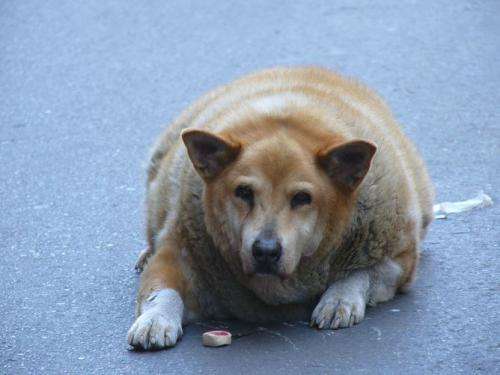It's a dog's life when man's best friend becomes his fattest

A study published this morning in Nature offers further insight into how dogs became domesticated. The comparative analysis of human, canine and wolf genomes suggests that humans and dogs have evolved in parallel as a response to the increasingly starchy diets on offer after the agricultural revolution. Such a wholesale change in diet has not necessarily been benign for either species.
As our waistlines have expanded, so have those of our pet animals. In fact, the rising incidence of obesity in humans and dogs seems to be linked; people at high risk of obesity are more likely to own and care for an overweight canine companion.
Problems and solutions
The problem of excess weight in dogs isn't just a matter of aesthetics. As with humans, obesity in dogs is linked to conditions such as arthritis, diabetes and heart disease. This makes excessive weight gain in pet dogs both a veterinary medical and animal welfare issue.
In biological terms, obesity in pet animals occurs for the same reasons it does in people. Affected individuals eat more than they need, and might also have a genetic susceptibility to putting on weight.
Current approaches to addressing canine obesity involve restricting the number of calories owners give their animals. This typically involves a proprietary "diet" food and owner education.
A weight-loss industry for pets has emerged in the United States, the United Kingdom and Australia. Canine boot camps and dieting clubs have sprung up to help owners achieve their dog's weight-loss goals.
At the same time, "fat dog" stories have become a news staple. Indeed, overweight pets have become collateral casualties in the ongoing war against human obesity.

Interestingly, the emphasis in this coverage revolves around one or more of three basic causal stories about people who own overweight animals:
- they buy and feed their dogs the wrong types of foods,
- they overfeed their animals to compensate for their inability to look after them properly, or
- they're morally culpable and are partaking in a form of abuse.
Despite a concerted campaign by animal health professionals, the incidence of canine obesity remains much the same. And efforts to make people "own the problem", including prosecution, have done little to curb canine excess.
While the application of surgical solutions to human obesity is rising rapidly, so far the consensus is that weight-loss surgery for dogs is unethical and that drugs are a shortcut for lazy owners.
A bigger issue?
The emergence of a canine health problem that reflects cultural and socioeconomic patterns is significant. As well as sharing our capacity for weight gain, pet dogs share our homes and built environment, our leisure activities and lifestyles.
We know socioeconomic status maps onto differences in health across human populations. The increasing rates of obesity in people is now recognised to involve a complex mixture of biology, individual choices, socioeconomic drivers of food consumption and declining levels of physical activity.
Studies in Britain and the Netherlands suggest these same factors are at play in the growing proportion of pet dogs that are overweight. And because people at higher risk of obesity are more likely to own an overweight animal, links between canine disease and the environment provided by the owner raises an ethical dilemma for companion animal veterinarians.
Recent controversies in the livestock and horse racing industries signal a major societal shift in attitudes towards animal welfare. If the way people live puts their pets at increased risk of debilitating disease, are we going to start regulating companion animal ownership on the grounds of future animal welfare? We might also wonder if it's fair to deny some people the benefits that come from sharing life with a pet animal.
These questions point to a number of unresolved tensions in our relationship with companion animals and the role vets play as protectors of animal welfare.
Treating disease in animals in our care is clearly the right thing to do. And since prevention is better than a cure, more attention needs to be given to the drivers of weight-related health problems in pets.
Experience with human populations indicates that teaching people how much to feed their animal may only be part of the solution. If vets are serious about reducing the burden of obesity-related disease in pet dogs, then the profession needs to take a larger role in public health.
Vets need to engage with community-based approaches to human and animal welfare. These could conceivably involve a role in urban planning, the framing of animal by-laws, and even directly promoting beneficial human health behaviours to encourage health and well-being across species boundaries.
Journal information: Nature
Provided by University of Sydney












